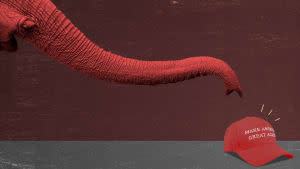In defense of J.D. Vance's Trump comments
- Oops!Something went wrong.Please try again later.

The backlash against Hillbilly Elegy author and newly minted Ohio Senate candidate J.D. Vance was fierce after he made the following observation in an interview with Time: former President Donald Trump "is the leader of this movement, and if I actually care about these people and the things I say I care about, I need to just suck it up and support him."
The prevailing interpretation is that, like the rest of the Republican Party, Vance understood Trump was a bad guy — in the Time writer's telling, he is "loud and racist and lie[s] a lot," which to Resistance and Never Trump folks is the whole story on the the 45th president — and then sold out to support him anyway. Leaving aside the fact that political parties do have to care about their voters' preferences, this is an unfair reading of Vance's comments.
Republicans who wanted to see the party take a different approach to trade, foreign policy, and immigration — and to the economic and cultural prospects of working-class voters who are increasingly voting GOP as white suburbanites abandon the party — found a vessel in Trump. He was, as Vance notes in the same interview, "not serious" and not "able to really make progress on the issues I cared about," at least not consistently. But Trump was elected president, which was a huge opportunity. And lots of Republicans would like to see a version of Trump's populism taken up by a better man, Vance included.
The fact that the voters most likely to be responsive to a shift in worker-friendly policies were the same ones who shifted toward the GOP with Trump on the ballot suggests there is some policy component to his appeal. But it is obvious that other things were a major driver too: His attitude helped him bond with a Republican base that feels beleaguered by liberal cultural forces and poorly represented by feeble GOP leadership; his fame gave him near-universal name ID; his reputation as a wealthy businessman gave voters confidence a political neophyte could run the government.
Flagging belief in that last bit was the difference-maker between 2016 and 2020. But a better version will have to have some of Trump's — or Tucker Carlson's — attributes to succeed as the GOP debates in next year's primaries whether personality or policy was a bigger draw.
You may also like
Why Facebook may not be celebrating the dismissal of 2 antitrust cases
Fox is launching a weather streaming service, and it's already feuding with The Weather Channel
Britain is going to try to 'live with' COVID. The rest of the world is watching.
